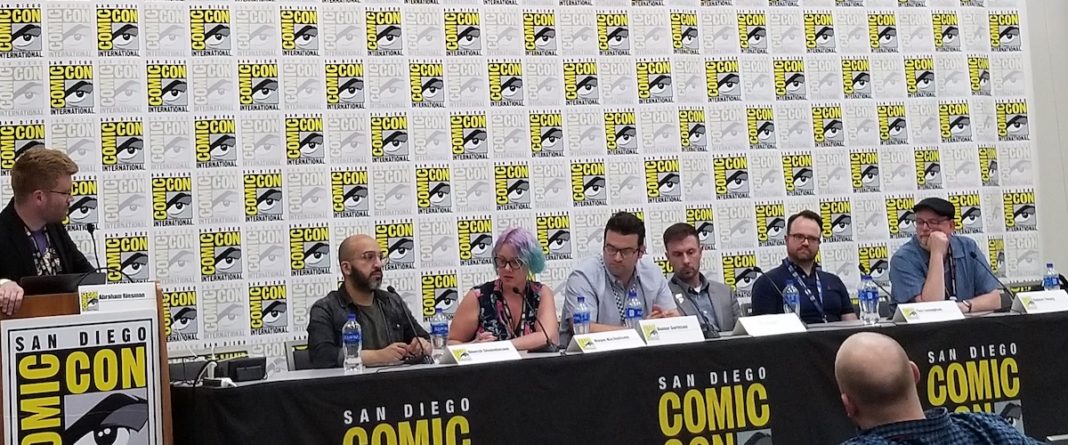Take a look at the exhibit hall at San Diego Comic-Con this year and the ongoing changes to the comic book industry are easily recognizable. DC Comics has combined their booth with Warner Brothers to create one, multimedia juggernaut and digital companies like ComiXology are expanding their foothold as their readership expands. Vulture reporter Abraham Riesman led a conversation with writers and executives for Friday’s “The Business of Comics” panel to talk about all the changes facing the comic book industry and how they’re trying to think differently in this new era.
One way that Hope Nicholson, an author/publisher/editor, keeps up with the shifting landscape is pursuing different marketplaces. Not only does she pursue traditional retail stores, but Nicholson is eager to sell to school systems and libraries. While she’s quick to admit graphic novels on suggested academic reading lists, she’s hopeful that will change soon. She’s had a few books “sell like crazy” in the University world and she believes that getting her books into elementary or middle schools would have a positive impact and potentially generate new fans.
Nicholson, who also publishes prose, admits that her two prose books have sold more units than all of her comics work because it is more easily sellable on the marketplace.
“There is no one path, there are a billion different paths and you have to figure out what’s best for your product,” she said. “I hope my books sell well in the book market but it’s refreshing to know it’s not wholly dependent on that.”
One way Boom! is getting their comics in-front of people is by sending out For Your Consideration packets of their work before the Eisners. Boom! President Filip Sablik credits marketing head Arune Singh, who has a background in TV marketing at SYFY, for coming up with the idea. For him “it’s a simple and elegant way to display their product,” and it helps get the book in some important hands.
In addition to sending it to influencers who may spread the word about their comics, Boom! Also sends them retailers as a reminder that they qualify as judges for the Eisner awards. This way, people who are at the frontline of selling comics are knowledgeable in their product and are reminded that they play an important role in the industry.
Sales for traditional comic book publishers are up, but Nicholson pointed out that “the biggest growth” in the comics space revolves around online distributors like Webtoon. There, artists can upload their work and immediately receive feedback from fans hungry for new content. The immediate accessibility, and ability to upload panel-by-panel or completed comics, puts creators and fans together in a whole new way.
Sablik revealed that Boom! is actually conducting an experiment of sorts by reformatting their series Heavy Vinyl through Webtoon. His goal is to engage with new audiences and test out if their work is still enjoyed in this different format. If they succeed, Boom! hopes the partnerships will compell new fans to seek out the publisher’s other titles.
Hunter Gorinson, the VP of brand and content strategy at Hivemind who used to be a part of Valiant’s marketing team, is just happy that kids are reading sequential stories at the highest rate since the 1940s. While he admits that the “impact of something like a double page spread can be compromised on a tablet” the breadth of options has led to comics being more ensconced in pop culture than ever before.
In Gorinson’s opinion, comic book fans have a “voice that’s not comparable to anything else.” When Hollywood or the video game industry adapt comics, executives “really care about what the fans think.”
As comic book continually become adapted into film, serving as introductions that hopefully bring new fans to the source material, it can be hard to ensure characters are adapted faithfully. To help counteract the problem, Valiant’s Dinesh Shamdasani tries his best to acquire enough “soft power” with the crew and cast that they all want to honor the comics. In order to do that, Shamdasani brought a lot of Bloodshot comics on-set while filming on the upcoming Vin Diesel movie occurred. With everyone from the department heads to the star himself reading the books, he could rest easy knowing the Valiant character would be handled well.
“I made a coalition of people who were excited about it, so it became a mission for everybody.”
The success of the Marvel Cinematic Universe may have made characters like Iron Man more popular in the public, but Robert Young, the owner of Borderlands Comics and Games, insists that “all these things create awareness but they don’t create customers.” Sometimes the fan’s appreciation for new characters results in them buying ancillary products like Funko Pops instead of directly engaging with the comics, so it falls back on the publishers to create something capable of capturing the attention of potential readers.
Being a part of the comic book industry, either from the publishing or retail side, is hard work. Sablik insists that people who stick through it truly love the product.
“Every single person that works in comics, from the creative talent to the people behind the scenes, folks in distributions, folks in retail, could 100% make more money doing anything else,” Sablik said. “The business of publishing comics is such a thin margin business that everybody is undervalued, but they’re here because they believe in the medium and the power of it.”








Comments are closed.